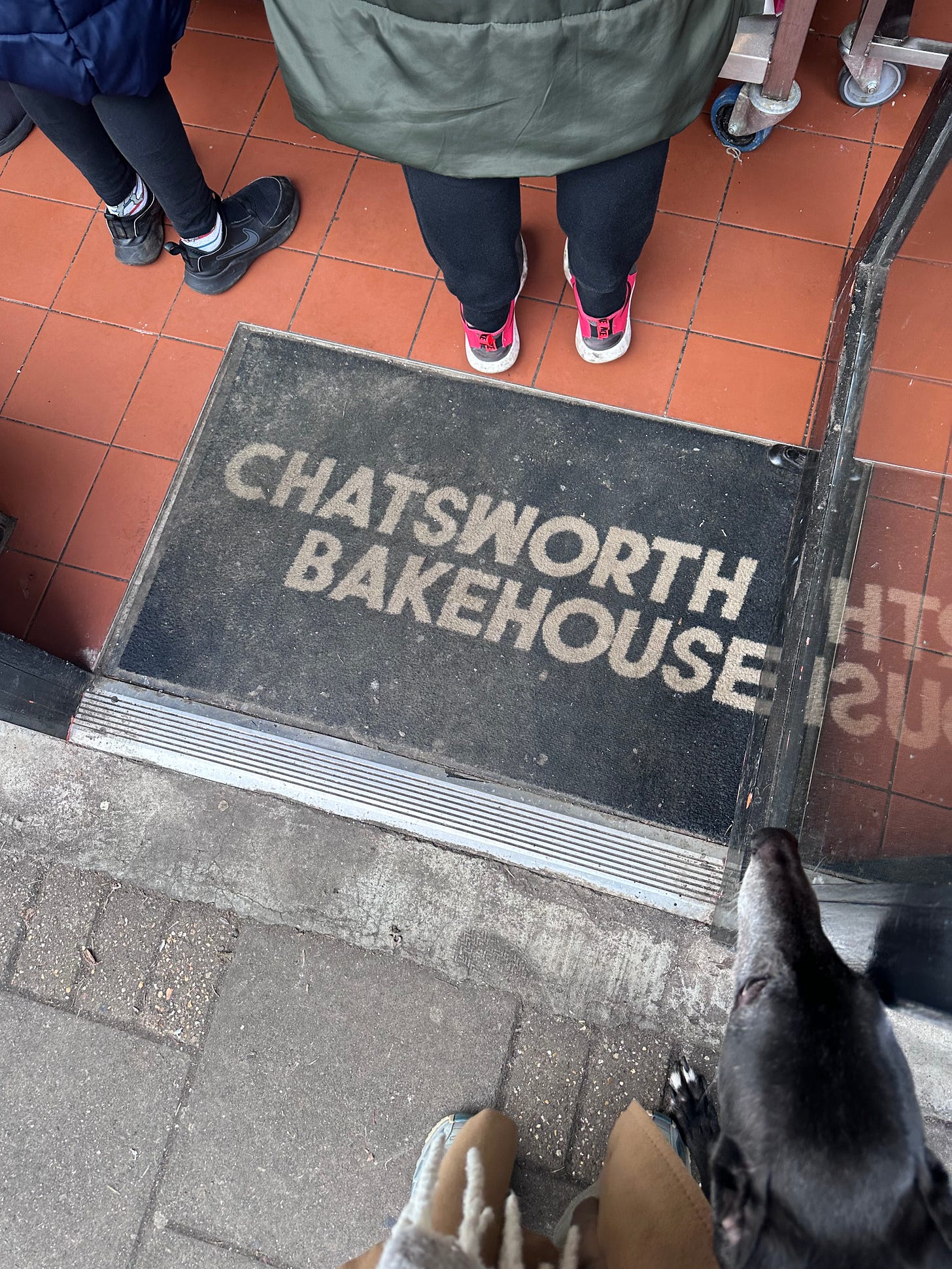How to read more this year
I asked my agent and friends who read for work how we can all read more, seeing as it helps with depression and that
I have a confession: I’ve already broken two new year’s resolutions.
The first was to stick to a regular writing schedule, not just with this newsletter, but with my novel-writing too. The second resolution, which goes hand-in-hand with the first, was to get up earlier. Reader, I rose at 10am this morning! Then I headed straight to Chatsworth Bakery in Crystal Palace to stock up on rhubarb slices (novel-writing fuel, I reasoned), before opening up my keyboard. This newsletter is due out every other Tuesday, and so I apologise that it’s a little late this week for no real reason, other than it’s January and I’m still finding my feet. It also comes as I reflect on my third resolution, which is to read more and hopefully, these tips will help you if this is also something you want to accomplish.
Most of us probably struggle with carving out time for reading due to a myriad of mundane yet unavoidable lifestyle factors which may include: being busy, stressed, or time-poor. Yet would that change if I told you that in times of hardship or mental anguish, books can be used as a form of therapeutic relief?
Bibliotherapy, for example, is a form of therapy that uses literature to improve mental health. People turn to a bibliotherapist to be prescribed a reading list that can aid their health and self-development in the same way a pharmaceutical drug might. Someone who is grieving, or going through a personal hardship might work with a bibliotherapist who has a background in psychotherapy, for example. When I was writing my memoir, Raceless, reading recommendations from my own therapist really aided my writing process and made it into the book. Over the years, I’ve also been humbled by the many people who have told me Raceless helped them process trauma or grief in relation to their own families or identities. Books can change our lives.
Studies also show that reading helps with developing empathy and reading other people’s emotions, and that children who read more have better interpersonal and social skills. So how can we do more of it? I asked my agent and two friends who read a lot for work, for their top tips.
Zoe Ross, world’s best agent, and actual book agent over at United told me she likes to get strict with reading routine. She says: “I recommend putting yourself to bed at a really unsociable hour, like 8pm. Leave your phone in another room and give yourself a good two hours with just the book.”
I concur. I’m currently a judge for the Edward Stanford travel writing prize. I have to read six (really thick!) novels in two months for the category ‘fiction with a sense of place’. My own travel book, Black Girls Take World was nominated for another Edward Stanford travel writing award back in 2022, and subsequent prizes are often judged by previous nominees. All this required reading is fantastic; it’s a lesson in self-discipline and it’s inspiring me while I complete my own novel. It’s also a real honour to be trusted to judge other people’s work. But as I am actually such a slow reader and read and write for a living, it’s still quite the undertaking.
I’ve found that approaching the task methodically is helping. For example, I’ve divided up the amount of time I have by how many books I need to read. Six books in 60 days = 10 days a book, give or take. I’ve also started with the largest book and moved onto the one I didn’t want to read next, instead of starting with an author I’m already familiar with. I also divide the number of pages by the amount of days I have, to keep me on track.
Granted, you might not like this approach because you’ll probably only be reading things you really want to read, but breaking it down and setting targets like me may help with self-discipline and focus. And definitely put your phone in another room, as it just removes the temptation to browse Vinted or TikTok.
Celiya Koster, a friend who works in scripted television production, has to whizz through loads of books for work when she’s scouting for stories. “One trick I find helpful is to download the audio book and read alongside listening, at the same time,” she told me. (I have never tried this!). “It’s so helpful to be fully immersed the text both visually and through audio. I play around with the speed, starting at 1.25 and slowing increase as I get into the book and characters.”
Celiya also confessed to “not finishing books” if they weren’t right to adapt. I don’t know about you, but I feel so guilty when I add a book to my DNF pile. But then, why should I? If a book isn’t for you and you’re only reading for pleasure, there’s no pressure to complete it. Free yourself from the tyranny of completing books you hate in 2025!
I also love turning reading into a little luxurious event. I’ll take my book and Jasper, my greyhound, to a cozy coffee shop, order a pastry, and settle in for some quality time with my book. It feels luxurious to carve out that space for myself. I did get into audio books during lockdown when I was also recording my own Audible documentary (called The Secrets In Us, which came out in 2021), but since then, I struggle to read books by listening to them. I don’t know why, but a part of me feels like it’s cheating, which is actually a load of abelist nonsense. However, I do prefer the physical act of holding a book as I like to make notes, mark pages and write down phrases that I find interesting or useful for my own work.
Charlie Brinkhurst-Cuff, a writer, editor and the very good friend who I run Take World writing retreats with, also leans on audio to boost her reading rate. Charlie, who’s also been a literary judge, acknowledges that you have to make reading a habit. “It’s really hard to find the time when you have lots of things to do or you already read for work, but audio books really help me, and you shouldn’t shy away from them as it still counts” she says. Charlie also recommends “the obvious stuff” to help reading feel more natural to do like “putting books in places I know I’m going to read them, so around the house, or in the bath.” She also says: “I also bring a book with me for long journeys or commutes to stop me going on my phone.”
Someone once told me that if you’re a total reading masochist, you can also try putting down a book when you’re hooked, or when you’re on a cliff-hanger. This will leave you waiting for the next opportunity to continue reading because you’re so excited to find out what’s to come. (I’m not sure I’d manage this, to be honest).
And if you’re looking for some top fiction reads by women of colour, my three favourites from last year include:
For Such a Time as This - Shani Akilah
This collection of interconnected short stories explores the lives of Black British-Caribbean Londoners with immersive third-person writing that leaps off the page. I’m not usually a fan of short stories but I found myself hinged on the outcome of every character, all of them beautifully flawed and utterly believable.River East River West - Aube Rey Lescure
This intergenerational novel follows Alva, a mixed-race 14-year-old born and raised in China, her stepfather, Lu Fang, and Alva’s troubled American mother, Sloane as all three grapple with their place in Shanghai amidst classism, visa and education struggles, and questions of identity. Poignant evocative storytelling, this novel had me in tears.Natural Beauty - Ling Ling Huang
Weird, wacky wellness body horror, his razor-sharp novel examines the extent to which beauty rules our lives. An unnamed Chinese-American musician takes a job at a high-end, holistic shop in New York City and soon becomes entangled in an obsessive pursuit of perfection, with dark consequences. I devoured this, but be warned: it’s a freaky read.
What else are you reading at the moment? And how are you making time for reading? Let me know as I’d love some more reccs.









Georgina this is a really useful blog with some great advice. I allocate specific times of the day to read books. Unfortunately my flat isn’t big enough to hold large volumes of paper books, so 95% of my purchases are e-books. I therefore have to get a notebook and pen to write the notes that I would otherwise write in the margins of the paper books. These notes are extremely useful for the reviews which I post on Amazon. I sometimes got to bed at 8pm and read, not for as long as 2 hours I have to confess, and my rate of unfinished books is fortunately low. I certainly found that RACELESS helped me to deal with the identity-based traumas that I have faced in the past, although they are fundamentally different to your own. So power to your elbow.